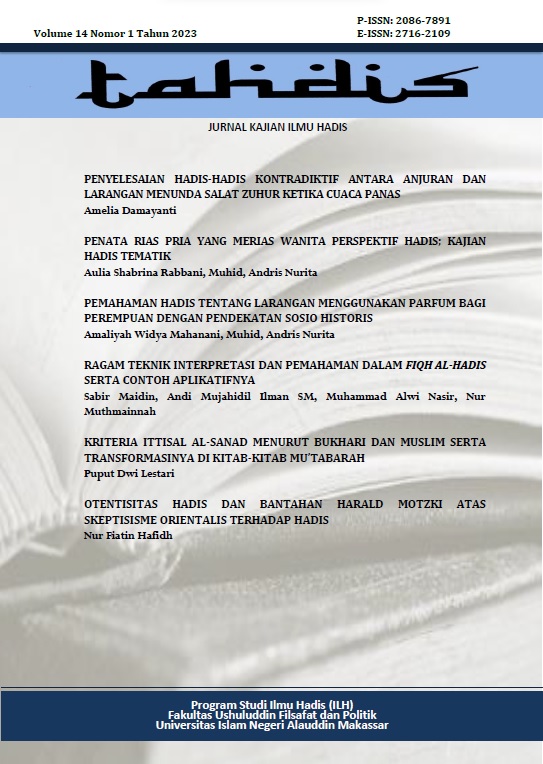Penyelesaian Hadis-Hadis Kontradiktif antara Anjuran dan Larangan Menunda Salat Zuhur Ketika Cuaca Panas
Abstract
This article will discuss two seemingly contradictory hadiths. The first hadith is about the advice to postpone prayer when the weather is still hot. The hadith explains that the postponement of the zuhur prayer until it is cold, so the prayer is not disturbed due to the hot air. And the second hadith explains there was one of the Sahabat of the Prophet who complained that it was too hot when he was about to pray and did not get his attention. Both hadiths are of the same quality as hadith s{ah{i>h and there are also many hadiths have same meaning as a proponent. The method used in this study is a qualitative method with the type of library research, collecting various literatures, both Indonesian and Arabic literature. The purpose of this research is to resolve the two conflicting traditions by using one of the Mukhtalif al-H{adi>th methods, namely al-Jam’u wa al-Tawfiq. As for the results of compromising the two, in the hadith narrated by Khabba>b, Prophet Muhammad does not mean not paying attention to his complaints. However, there are other hadith narrations that explain that it was the habit of the Prophet to give his clothes as a forehead mat when prostrating so that the ma’mum would not feel hot. Then from the Shafi'i and Maliki madzhab, they think that all prayers must be performed at the beginning of time except for the zuhur prayer when the heat is very hot. And according to the Hanafi and Hanbali madzhab, all obligatory prayers must be performed at the beginning of time without exception.
Authors who publish with this journal agree to the following terms:
(1) Authors retain copyright and grant the journal right of first publication with the work simultaneously licensed under a Creative Commons Attribution License that allows others to share the work with an acknowledgment of the work's authorship and initial publication in this journal.
(2) Authors are able to enter into separate, additional contractual arrangements for the non-exclusive distribution of the journal's published version of the work (e.g., post it to an institutional repository or publish it in a book), with an acknowledgment of its initial publication in this journal.
(3) Authors should sign copyright transfer agreement when they have approved the final proofs sent by Biogenesis prior the publication.







